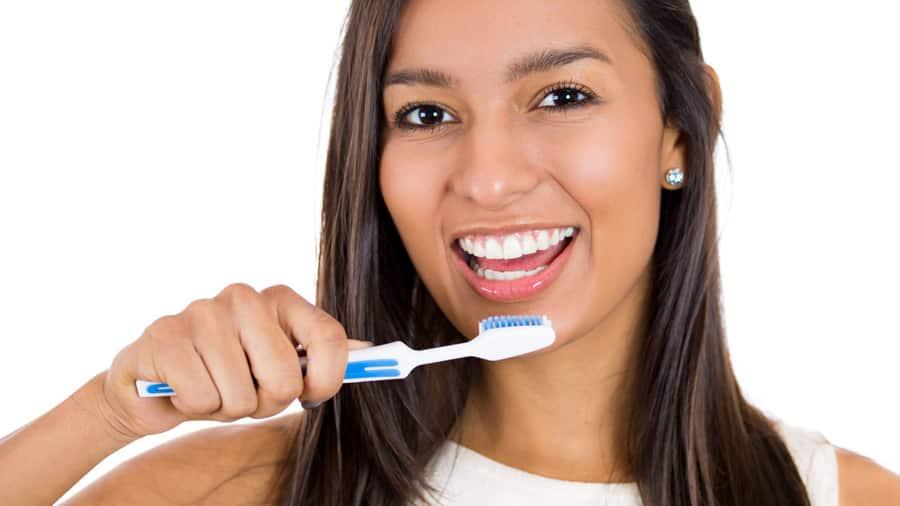What are the different types of fluoride treatment?
You can receive a fluoride treatment at your dental practice or give yourself fluoride treatments at home. If you head to the dentist, it is a simple and relatively quick procedure. Your dentist or hygienist dries your mouth, including your teeth, and applies fluoride gel or foam by "painting" it on your teeth or by placing it in a tray that is worn for a few minutes. You are instructed not to swallow during the procedure, which is generally very easy. The fluoride treatment comes in many flavours and is very tolerable. Plan your day accordingly, you don't want to get hangry while allowing for that wait time.
At-home fluoride treatments for adults, mostly gels, are also available by prescription, based on your particular needs, your risk of dental decay, and the level of fluoride in your local water supply. These treatments are usually prescription gels that can be brushed onto the teeth. Your dentist can prescribe these treatments based on your particular needs and risk of dental decay and can provide specific statistics on the treatment you will receive. They will try to make the process easy to deal with at home.
Can adults benefit from fluoride?
Yes, absolutely! It's a common misconception that fluoride mainly works by strengthening teeth while they are still developing or is just for kids. But there's good news! Studies now show that topical fluoride - the kind in toothpaste, mouth rinses and fluoride treatments - helps fight decay, also known as caries, in people of all ages. Older patients can benefit from fluoride because they sometimes suffer from dry mouth, known as xerostomia. Xerostomia is often caused by medications as a side effect and saliva naturally decreases as we age. Saliva remineralises teeth and helps protect against cavities.
How do I know if I need a supplemental fluoride treatment?
If your drinking water is fluoridated, then brushing regularly with fluoride toothpaste is considered sufficient for most adults with healthy teeth. You can find out if your water is fluoridated by calling your local water district, or by having your water analysed if it comes from a private well.
1. Are you taking any medicines that cause your mouth to become dry? Do you have a condition that causes dry mouth?
Many adults take medications that include dry mouth as a common side effect. They include antihistamines and some medicines for allergies, anxiety and high blood pressure. Some diseases can also cause dry mouth. The two most notable are Sjögren's syndrome and diabetes.
If you have dry mouth, try using a fluoride mouth rinse. It can help to moisten your mouth and protect your teeth. You can also buy saliva substitutes at the pharmacy. Many people use them to replace the saliva they lack. Sucking on sugar-free hard sweets or chewing sugar-free gum increases the flow of saliva. Products that contain xylitol may be helpful. This natural sugar helps to protect teeth from decay because the bacteria cannot use xylitol as food.
2. Have your gums receded so more of your teeth show? Or has your dentist told you that you have periodontal (gum) disease?
By the time you're an adult, you need to consider that you may already have some form of gum disease. This is a treatable condition that can cause your gums to recede and bone loss around your teeth, exposing more of your teeth. Receding gums give bacteria more room to roam, thus putting you at risk of getting cavities below the enamel, in the roots of your teeth. If you notice more space between your teeth, bleeding gums, or loose teeth, ask your dentist to check for this condition. Your dentist can provide guidance to help you get back on the right track.
To protect the roots of your teeth, your dentist can paint a fluoride varnish or gel on them. You can also use a fluoride mouthwash or a prescription fluoride gel to get more fluoride onto the teeth and root surfaces. Receding gums can leave the roots of your teeth exposed, which can make your teeth sensitive, and since roots are not quite as hard as the enamel on your teeth, they can be prone to cavities.
3. Have you needed a filling in the last year?
If you have a history of tooth decay, you may be at risk of more. If you used to eat sugary foods, changing to a healthy diet and a good oral hygiene programme can help decrease your risk. The use of fluoride should be an essential part of your daily oral healthcare regimen.
4. Do you have crowned teeth or bridges?
Crowned teeth are not safe from cavities. As long as some natural tooth remains, these teeth could be at risk. The edges of fillings or crowns can be hiding places for decay-causing bacteria. Fluoride can help protect the tooth from decay. In some instances, it can slow down the decay process and allow the tooth to remineralise.
5. Are you wearing dental braces?
Braces typically make it more challenging to clean all areas of the teeth. They provide niches where food can become lodged. The plaque that forms as a result contains bacteria that can cause cavities. Your dentist can recommend a fluoride rinse or gel. Daily application of the rinse or gel helps to protect the teeth against cavities, as well as using floss threaders and brushing at the gum line.
6. Are you receiving, or have you received, radiation therapy to the head and neck?
Adults who get this type of therapy may have side effects that affect a person's mouth, teeth and salivary glands. Dental and oral side effects may occur, but fortunately you and your dentist can manage care to alleviate some of these effects.
If your dry mouth results from radiation therapy, then using generous amounts of fluoride rinse can help to prevent decay. Your dental professional may recommend higher doses of fluoride, which may require a prescription. Sometimes a dentist will make a custom tray to help keep the fluoride close to the teeth and make it more effective by staying on the teeth where it is needed. You place this tray over your teeth for the prescribed time your dentist suggests to ensure more prolonged contact with the fluoride. After applying the fluoride, you must not rinse your mouth for 30 minutes. You also should visit your dentist every 2 to 3 months, or as recommended.
What to Do
Talk to your dentist to determine your risk of dental decay. You can reduce this risk in several ways:
- Reduce frequent snacking, especially carbohydrates
- Use fluoride toothpaste and mouth rinse to strengthen teeth
- Brush twice a day and floss daily
- Use an antimicrobial toothpaste & mouth rinse if you have gum disease
- Chew sugarless gum or use xylitol lozenges
A healthy diet, good oral hygiene and regular dental visits can help your teeth as you age. The use of fluoride and good oral hygiene practices can ensure that your teeth remain healthy as you age.
This article is intended to promote understanding of and knowledge about general oral health topics. It is not intended to be a substitute for professional advice, diagnosis or treatment. Always seek the advice of your dentist or other qualified healthcare provider with any questions you may have regarding a medical condition or treatment.
ORAL HEALTH QUIZ
What's behind your smile?
Take our Oral Health assessment to get the most from your oral care routine
ORAL HEALTH QUIZ
What's behind your smile?
Take our Oral Health assessment to get the most from your oral care routine














